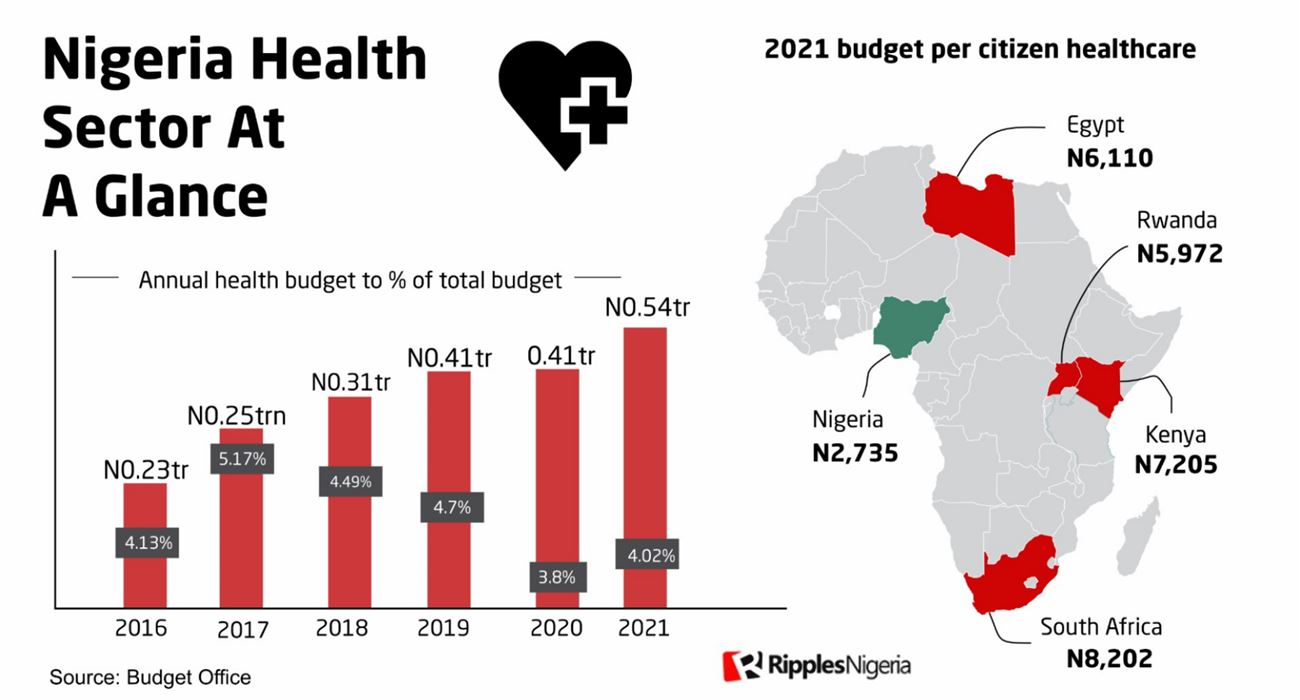News
RipplesMetrics: Every month, Nigeria budgets only N200 for healthcare of each citizen in 2021

A review of 2021 approved budget indicates that Nigeria may be spending just a little over N200 for the healthcare of each citizen.
At a time of health crises, never seen before, the federal government has deemed it fit that with N227 it would be enough to provide for the monthly healthcare of each of the estimated 200 million Nigerians.
The share of healthcare spending for 2021 is N547 billion, 4 percent of the budget’s total of N13.58 trillion.
This meager share is a far cry from the 15 percent agreed by African countries in 2001 on healthcare spending to total budget.
The amount comprises N380.21 billion for recurrent expenditure and N132 billion for capital projects. There is also N35.03 billion Basic Health Provision Fund, which includes funds for managing emergencies and infectious diseases such as the COVID-19.
What this figure means is, if all 200 million Nigerians were to queue up at the gate of Federal Ministry of health monthly, each person would only be entitled to N227 or N2735 yearly for healthcare.
In comparision, 53 million Kenyans will get N600 monthly or N7,205 yearly in the N387.4billion (111.7 billion Kenya shillings) the Kenya government budgeted for health care.
Similarly, in South Africa, what the government budgets for national and provincial health programmes for her 56 million citizens is N5.80 trillion(R 229.7 billion) which amounts to N98,425 yearly or N8,202 monthly.
For 102 million Egyptians, the government budgeted N6.2 trillion(258 billion egp), representing N6,110 yearly or N510 monthly for her citizens.
Rwanda in 2019 allocated N77.36 billion (FRW200.8 bn) N5,972 yearly or 497 monthly, a figure the government plans to increase this year.
Botswana also in 2018, had a budget of N266 4 billion (P8. 1 billion) for its health care system which amounts to N113,316 per citizen yearly or N9,443 monthly.
Other countries m, such as Niger, Zambia, Malawi and Burkina Faso, Togo also prioritize healthcare in their budgets.
Nigeria’s Healthcare Numbers
A closer look at the budget provides a grimmer picture.
Despite Nigeria’s high malaria burden and mortality rate, the government’s total budget for the fight against the disease is N297 million for the entire year.
According to the World Health Organisation (WHO), 15 countries accounted for 80 per cent of all malaria cases globally in 2016. Nigeria (27%) is the highest proportion of cases globally, followed by the Democratic Republic of the Congo (10%), India (6%) and Mozambique (4%).
Despite this high figures, the approved budget shows the allocation for malaria in the approved budget is lower than the N305 million each Senator is expected to have earned in 2021.
The items on malaria in the budget includes:
1. MOD malaria tuberculosis & HIV research programme ongoing – N30,889,953
2. Continuation of malaria vector control project: development of effective and long lasting herbal topical cream, indoor residual spray and outdoor larvicide/insecticide using non-pyrethroid plants and staff capacity building new — N25,316,366
3. Phase 1 – clinical evaluation of agency’s NAFDAC listed products (antimalaria and anti-diabetic) new — N20,496,781
4. Continuation of development of tea form (antermiasia annua + moringa and others) tablet and capsules (artimesia annua + moringa) herb-herb combination anti-malaria therapy new — N10,415,315
5. Malaria control: transcriptome profiling of mosquito response to sublethal doses of pyrethroid; phase 1 ongoing — N13,547,033
Read also: RipplesMetrics: For every N100 earned, Nigeria spent N82 paying debt in 2020
6. Enlightenment campaign to youth/women against HIV/AIDS, rollback malaria and cancer in the Niger Delta region ongoing — N30,000,000
7. Integrated vector management control of malaria; procurement of entomological materials for monitoring resistance in Ogun, Imo, Kaduna, Platea, Katsina, Anambra, Nasarawa, Bauchi And Delta States; coordination, monitoring and evaluation of malaria intervention activities new — N19,598,329
8. Procurement of MRDTS for rapid diagnosis kits for malaria, procurement of 5,000,000 doses of (sulphadoxine pyrimethamine) for treatment of pregnant women in malaria treatment and procurement of 4,000,000 doses of acts and distribution to health facilities — N146,987,468
… And more neglect
Another apparent neglect with regards to citizens health is the N35,025,926,586 allocated to Basic Health Care Fund(BHCF).
BHCF is the programme which seeks to remove financial barriers to accessing primary healthcare, particularly for the poor and vulnerable.
The N35 billion allocation is 31.6 percent lower than the N51.21 billion in 2019 and only 0.25percent of the consolidated Revenue fund.
According to National Health Act (2014), at least 1 per cent of the Consolidated Revenue Fund (CRF) shall be allocated to Basic Health Care Fund (BHCF)”.
In the 2021 Appropriation Bill, the Consolidated Revenue Fund (CRF) is N13.58 trillion, which means that the one per cent allocation to BHCF should be N135.8 billion and not N35.02 billion allocated.
With Nigeria’s coronavirus case racing to 116,655, with 1,485 confirmed deaths, as at 22 Jan, 2021, Nigerians will be hoping they don’t have to spend their savings or ask friends and relatives for money, just to pay the hospital bill.
By Dave Ibemere…
Join the conversation
Support Ripples Nigeria, hold up solutions journalism
Balanced, fearless journalism driven by data comes at huge financial costs.
As a media platform, we hold leadership accountable and will not trade the right to press freedom and free speech for a piece of cake.
If you like what we do, and are ready to uphold solutions journalism, kindly donate to the Ripples Nigeria cause.
Your support would help to ensure that citizens and institutions continue to have free access to credible and reliable information for societal development.
























